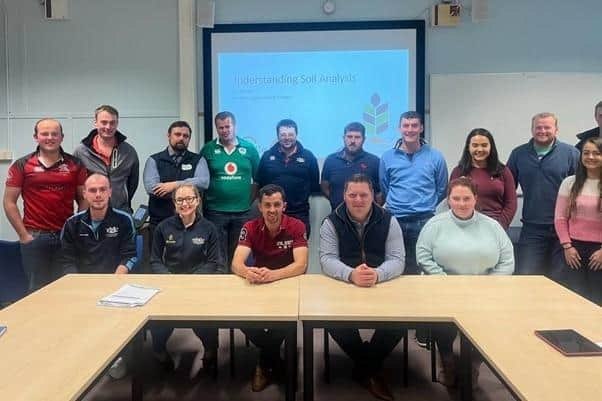YFCU members gain valuable soil insights
and live on Freeview channel 276
With the recent launch of DAERA’s Soil Nutrient Health Scheme, it is important that members of the committee understand the results they are receiving from their soil samples and the changes they must make on their farms.
The nutrient soil health scheme was launched in 2022, the scheme is being rolled out on a zonal basis with all the zones completed by 2026.
Advertisement
Advertisement
All farmers will be given the opportunity to join the scheme.


YFCU provides opportunities for young people to develop practical skills, make new friends, and contribute to their local communities.
It is a dynamic and vibrant organisation dedicated to empowering and supporting young individuals in rural communities.
The association is pleased to witness the AERA committee gathering to discuss and learn from industry professionals about crucial topics like soil sampling and analysis, which align perfectly with their mission to educate and engage the next generation of farmers and young people in rural communities.
Advertisement
Advertisement
Soil is the most important asset on a farm and managing soil has a big impact on the crops produced and the profitability of the farm.
Gary shared that 82% of soils analysed are below target fertility.
Soils should be analysed every four years to better understand the nutrients available, allowing farmers to use the correct fertilisers.
He stressed the importance of understanding the fertility of soils on farm is the first step to growing healthy crops and grassland.
Advertisement
Advertisement
Gary then explained to the committee the importance of first having the correct soil pH.
Over time, grassland soils have a tendency to become more acidic, due to rainfall, decay of organic matter and fertiliser.
Research shows that 57% of grassland soil samples are below pH 6.0, which has knock-on effects on nutrient availability. Ideally, soils should have a pH of 6.5, most nutrients are more available when soils are very slightly acidic.
Gary explained to AERA members, the importance of having the correct soil pH to get the most out of the fertiliser they are applying to their ground, he let members know if their soil pH is too low, they are potentially wasting £65/t of fertiliser applied.
Advertisement
Advertisement
He then focused on pH correction through the use of granular and bulk lime, sharing that the best time to lime is in autumn and spring, avoiding silage season, as lime will inhibit the fermentation process.
Gary then spoke on the nutrients which are included in the soil sampling results, focusing first on phosphorus (P) which is important for crop establishment, root development and plays an important role in the nutrition of livestock.
Then he focused on potassium (K) which is needed for increasing stem strength and increasing yield, potassium is very important for silage and cereal crops. He also shared information on calcium, sulphur, and magnesium.
Gary shared with members how to optimise the results from their soil analysis, he emphasised the importance of establishing the areas of the farm that need lime to correct pH.
Advertisement
Advertisement
He focused on identifying areas of soil with low and high P&K and targeting these areas with organic manures.
He also spoke on the need to develop a field-by-field fertiliser programme to select the most suitable fertiliser types and application, sharing tools to do so, such as the Fane Valley fertiliser planning programme and the CAFRE nutrient calculator.
Gary then concluded the talk with a Q&A.
Members took the opportunity to ask lots of questions, many interesting topics such as worms, spreading milk on grassland and using eggshells to condition the soil arose from this Q&A session.
Ian Walker, AERA committee chair, remarked: “Gary's talk was very interesting, everyone in the room took away something that will help them to improve their soil health and better understand the results they are receiving from their soil analysis.”
The committee would once again like to thank both Fane Valley and Gary for taking the time to attend the YFCU AERA meeting and share valuable insights and knowledge with members.